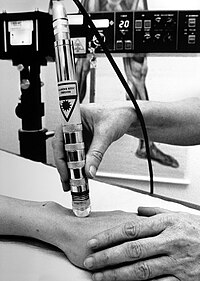
Photo from wikipedia
Low‐level laser therapy has shown successful results in the prevention and treatment of oral mucositis. One of the concerns about low‐level lasers is their effects on remaining malignant cells in… Click to show full abstract
Low‐level laser therapy has shown successful results in the prevention and treatment of oral mucositis. One of the concerns about low‐level lasers is their effects on remaining malignant cells in the area. Interleukin‐6 is a multifunctional cytokine that plays an important role in a wide range of biological activities in increasing tumor functions, decreasing survival and resistance to chemo‐radiotherapy. Vascular‐endothelial growth factor increases tumor vascularization. It has been shown in the previous studies that LLLT can cause an increase of IL‐6 and VEGF in some cells. The present thesis aims to study the effects of LLLT on IL‐6 and VEGF expression, as well as cell viability on OSCC cells. Tumorigenic cells of an oral squamous cell carcinoma cell line were irradiated with 3 different diode lasers, and were compared to the control group (660 nm–200 mW–4 J cm−2, 810 nm–200 mW–4 J cm−2, 940 nm–200 mW–4 J cm−2). MTT assay, ELISA and RT‐PCR were used to measure cell viability, IL‐6 and VEGF expression. Cell viability of all laser‐irradiated groups was significantly lower than the control group. VEGF expression increased in laser‐irradiated groups. This was only significant in the 810 nm group. IL‐6 protein secretion was significantly higher in all laser‐irradiated groups compared to the control group.
Journal Title: Photochemistry and Photobiology
Year Published: 2022
Link to full text (if available)
Share on Social Media: Sign Up to like & get
recommendations!